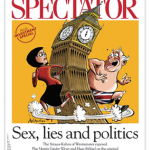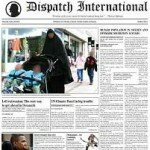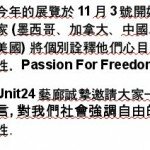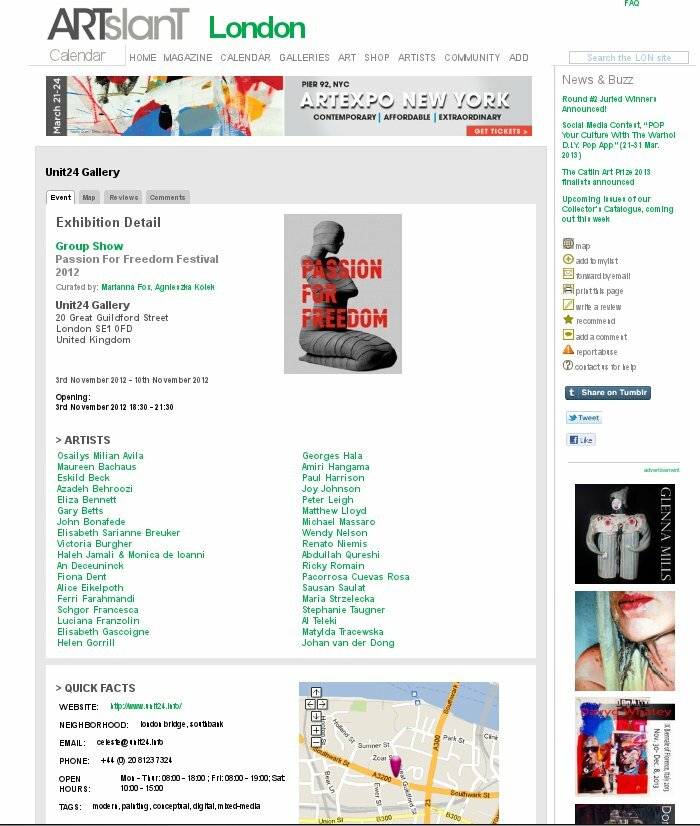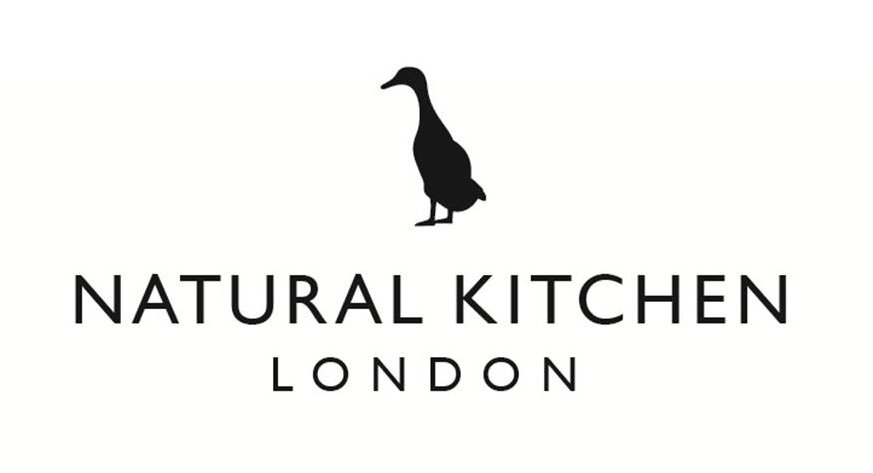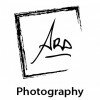My life as a connoisseur
Posted In press 2012

‘Passion for freedom‘ is now holding its fourth exhibition at the Unit 24 Gallery just behind Tate Modern. The show is a visible and occasionally dazzling manifestation of an often submerged movement in western liberalism that regards the liberal-left mainstream with something close to disgust.
They – we – find the indulgence of radical Islam as a betrayal of the best of the liberal tradition. We are equally repelled by multi-cultural orthodoxy, which puts the interest of a ‘community’ before the interests of the individual, particularly when the individual is a woman. The magnificent Maryam Namazie, One Law for All’s Spokesperson, and a woman you will rarely hear on the BBC, explained the show’s purpose. ‘Real change comes about by challenging and dissenting not by appeasement and silence. It comes about by breaking taboos and pushing aside that which is deemed sacred and art is such an important way of doing this. As Ai Wei Wei says, “if we don’t push, nothing changes”.’
As in previous years, the organisers tempted artists to submit by restating their core principles.
1. Create space for artists and writers who discuss subjects omitted in politically correct circles.
2. Invite people to open and uninhibited discussion. Nothing is more important than critically informed debate. That’s how society has advanced through the ages.
3. Gather like-minded people creating a network of actively engaged citizens who hold high the value of individual’s freedom
[..]
Despite the Fear
Posted In press 2012
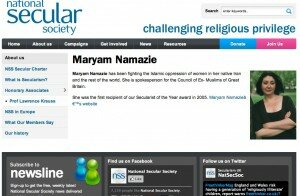 Despite the Fear
Despite the Fear
by Maryam Namazie
Last night’s private viewing of One Law for All’s 4th Passion for Freedom Art Festival was absolutely brilliant. I spent most of the night on the couch in the back feeling ill but managed to give my speech. The art was fantastic – some shocking, others heart-wrenching or inspiring, and all of them thought-provoking. The festival is on until 10 November so drop by if you can. More details on the night’s winners are to follow but here is a piece by Nick Cohen in the Spectator about it.
You can also see some photos of the night here. The people’s vote went to a painting in homage to Pussy Riot (see featured photo). Here’s my speech:
Under totalitarianism and dictatorship, one eats “fear for breakfast, fear for lunch and for dinner, fear” says Uruguayan writer Eduardo Galeano.
Fear is palpable when one lives under an Islamic inquisition, even if it’s not experienced directly.
Even here in Europe – Islamism’s Sharia laws and fatwas of censorship and death for everything from blasphemy, heresy, and apostasy become secular ones – where the artist or dissenter is not routinely imprisoned or killed (even if the threat is always there) but proclaimed ‘guilty’ of offence, disrespect, intolerance, and Islamophobia, thereby making censorship and self-censorship ‘justifiable’.
Where it rules, Islamism forbids you to dissent; here, it convinces you that dissent is impossible.
Yet fear is only part of the story; it is what we do despite the fear that counts.
In the late 1980s, whilst working in Sudan, I and a Burmese colleague whose name I cannot recall initiated an underground human rights organisation opposed to the Islamic regime there. When things got tricky, he said the fear was secondary. Taking action – even when one is afraid – that is the sign of true courage.
Though I do often wonder who is really afraid of whom?
Islamists are even afraid of 15 year old Malala who wants the right to go to school.
It is they who are afraid of the truth. And of us.
One Law for All – and its Passion for Freedom Art Festival – speaks truth to power and demands change, despite the fear. But it also aims to honour our artists and our dissenters.
No society or community is homogeneous. Dissent and great art is alive even in the furthest and darkest corners of the globe. As is immense courage.
As Salman Rushdie says: “Great art, or, let’s just say, more modestly, original art is never created in the safe middle ground, but always at the edge. Originality is dangerous. It challenges, questions, overturns assumptions, unsettles moral codes, disrespects sacred cows or other such entities. It can be shocking, or ugly, or, to use the catch-all term so beloved of the tabloid press, controversial. And if we believe in liberty, if we want the air we breathe to remain plentiful and breathable, this is the art whose right to exist we must not only defend, but celebrate. Art is not entertainment. At its very best, it’s a revolution.”
One of the artists celebrated at the festival, Ai Wei Wei says: “If we don’t push”, nothing changes. Clearly, change it must.
Freedom of the press cannot be limited without being lost
Posted In press 2012
 “Freedom of the press cannot be limited without being lost.”
“Freedom of the press cannot be limited without being lost.”
– Thomas Jefferson
LONDON. Forty artists from around the world have got together due to their fear that the
West is in the process of abandoning freedom. Their exhibition Passion for Freedom in
London asks the question: Will our attempt to institute multicultural harmony pave the
way for a totalitarian society?
What is freedom? How easy is it to lose it? And how hard is it to get it back?
These are great questions which are not easily answered.
Even so, 40 artists from around the world are at the moment making an effort at the art ex-
hibition “Passion For Freedom” in London.
The fact that it is held in the British capital for the fourth consecutive year is not a coinci-
dence.
With the introduction of Sharia courts and a growing number of burqa-clad women on the
street, freedom is no longer a matter of course in the country that gave us the Magna Carta
and the Bill of Rights.
Freedom is something that is increasingly called into question.
It is also not a coincidence that several of the organizers behind Passion For Freedom are of
Polish / Russian origin. They have experience with more than liberal democracy.
“We know the totalitarian by its smell,” says Marianna Fox, a 27-year-old designer with roots in Russia.
Together with her co-organizers – among others the organization One Law For All – she
has worked hard for months to get the show up and running.
“We are concerned to see that so many people take freedom for granted. Too many doesn’t
realize how fragile it really is, and we would like to draw attention to this.”
She stresses that the exhibition focuses on all threats to freedom. Thus China, Cuba and
other states where freedom is in difficulty are subject of artistic treatment.
What many of the 40 artists have chosen to focus on, however, is not happening only under
distant skies. It is also happening in Britain, as well as in the rest of Europe.
Islam poses a threat to freedom that it is impossible to overlook, says Marianna Fox.
“Many of us who work with the exhibition know what it was like under communism. We
were young when it collapsed, but we recognize the fear and censorship that stems from Is-
lam today.
“We cannot just stand idly by while politicians restrict our freedom of speech and introduce
Sharia courts all over Britain. We have to say no. We have to insist on equality before the
law and the right for everybody to express their opinions freely. Otherwise we have learned
nothing from history, and we are likely to repeat it.”
That is a point with which the Iranian-born artist Azadeh Behroozi totally agrees.
Her painting illustrates the problem of the Muslim practice of covering of girls and women.
“With regard to religious tolerance, Sharia law is unfortunately tolerated many places in
Britain. But no matter what you refer to, Sharia always results in the suppression of the
rights of girls and women,” says Azadeh Behroozi.
She would like Britain to do the same as France – imposed a ban on veiling in public places.
“The veil is a symbol of oppression – a symbol that women are subordinate to men. As with
Sharia in general it should not have a place in any society – and especially not in a Western
society,” she continues, and apologizes that she does not want her picture taken. It’s too
risky, she says.
Another work of art that attracted much attention at the opening on November 3rd was nei-
ther beautiful or inspiring. It describes the cruel reality for many Muslim women.
The painting depicts a woman with an acid-damaged face. In one hand she holds a book
with blank pages – in the other a burqa.
The artist Amiri Hangama was born in Afghanistan – she now lives in Canada.
“It’s a 17-year-old girl I met on a trip back to Afghanistan. After 2001, when the Taliban
were driven out, she started going to school – that’s what the book symbolizes. Unfortu-
nately the Taliban returned shortly afterwards. They threw acid in her face, and she was
scarred for life. Today she is back under the burqa like many other Afghan women.”
Violence against women – or to be specific, female genital mutilation – is also the theme
that English-born artist Fiona Dent has taken up.
Her painting ”Madonna of Mutilation” depicts a woman with cut and sewn lips.
In the accompanying description of the painting the artist asks whether the British politi-
cians and authorities would wake up if every year 24,000 little girls had their lips cut off
and their mouths sewn together.
“The question is rhetorical; of course they would,” says Fiona Dent.
But it is obviously a different story when it comes to the more subtle cutting of female geni-
tals.
“London prides itself on being the capital of freedom,” she snorts.
“But as long as 24,000 young girls every year are being abused in this way, it is a very mis-
leading title.”
“Tolerance of such atrocities has nothing to do with freedom or humanism at all, it is a
crime – a crime against humanity,” says the artist, who through her job as a social worker
and using the available statistics, knows the extent of the problem.
She explains that the phenomenon is well known among doctors and nurses – not to men-
tion teachers. But political correctness gets in the way – no one dares do anything about it.
“In this country there has not been one a single lawsuit about this matter. It’s a terrible dis-
grace,” says Fiona Dent.
Passion For Freedom is open 3rd-9th November at the address Unit24 Gallery, 20 Great
Guildford St, London.

